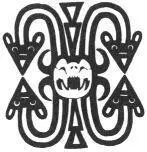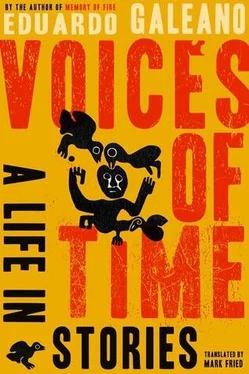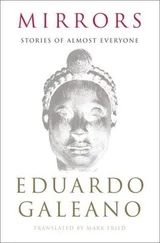The adviser was first on a long list.

The day is born, touched by the sun’s fingers.
In the countryside of El Salvador, women light fires and begin their chores.
“How did you dawn?” they ask, because, like the day, they dawn.
And by their bodies they know what the new day will bring.
During the war years, every woman’s body at dawn was a map of fear. If fear pressed against her breasts, one of her sons would not return. A sharp pain in the belly meant the army was approaching. And if her kidneys ached, there would not be enough water in the well and she would have to risk their lives searching for more.
The river nearly swallowed her.
Eufrosina Martinez was washing clothes when the current caught her and dragged her downstream. After a lot of flailing about among the rocks, she managed to save herself, but she lost her soul. The fright took it. Her soul, scared stiff, sank and vanished from sight.
After that, the soulless body of Eufrosina could not move or eat or sleep or distinguish night from day.
A healer from the mountains of Puebla cured her. Her soul returned from fear and rejoined her body. Then Eufrosina rose and walked once more on this earth that sometimes snatches your feet from under you, like an angry river.
Playing nonstop, everybody thrown in together, the kids lived in a joyous scramble of bugs, children, and plants.
But one awful day, some wanderer reached that tail end of nowhere in the expanses of Paysandu and brought fear.
“Watch out, the bogeyman’s coming!”
“The bogeyman is coming to take you away!”
“The bogeyman is coming to eat you up!”
Olga Hughes noticed the first symptoms of the plague. A sickness that no pharmacy can cure began to afflict her numerous children. And that’s when she chose from among her many dogs the tamest and friendliest one, and baptized him Bogeyman.
Through the streets wandered the healer of tools that had lost their edge.
The sharpener’s foot spun the emery wheel and pulled showers of sparks from the blades of knives, razors, scissors. We neighborhood kids, a swarm of admirers, were the audience for the show.
Just as the organ announced the wafer man, the flute was the crier for the sharpener.
People said if you were thinking about something and heard the sound of that flute, you changed your mind on the spot.
Practically no sharpeners remain on the streets of cities; the whistle of their flutes no longer drifts in through open windows. Other songs resound instead, tunes of trepidation, airs of alarm, and many are the people who change their minds in a flash.
The ship glided south along the Swedish coast on a calm sea.
It was a splendid summer morning. The passengers sat on deck enjoying the sun and the soft breeze, waiting for breakfast.
Suddenly, a girl ran to the railing and threw up.
Then the woman beside her did the same. Immediately, two men got up and followed suit. One after another, the rest of the passengers seated in the bow also vomited.
Those seated on the poop deck laughed at the ridiculous spectacle, but soon a few of them were leaning out over the calm sea and putting their fingers down their throats, and others followed.
No one could keep from vomiting.
Victor Klemperer was in one of the seats farthest aft. To keep from joining the retch-fest, he concentrated on the meal to come: coffee with cream, orange marmalade. .
Then the passengers in the stern had their turn. Every one of them threw up. He did too.
Klemperer forgot about this incident. It came back to him a few years later in Germany, during Hitler’s unstoppable ascent.

The country no one invades, and has the habit of invading others, is terrified of being invaded.
In the eighties, the threat was called Nicaragua. President Ronald Reagan fumigated public opinion with toxic clouds of fear. When he went on TV to decry the danger, a red tide flowed across the map projected behind him. A torrent of blood and communism spread from Central America, washed over Mexico, and penetrated the United States through Texas.
The TV audience hadn’t a clue where Nicaragua was. Nor did they know it was a barefoot country flattened by half a century of dictatorship manufactured in Washington, and by an earthquake that erased much of the city of Managua from the map.
The fount of fear had a total of five elevators, plus an escalator that wasn’t working.
It was the year 1964, and the dragon of international communism spread all seven of its maws wide-open to devour Chile alive.
Ads bombarded public opinion with images of burned-out churches, concentration camps, Russian tanks, a Berlin wall in downtown Santiago, and bearded guerrillas carting off children.
Elections were held.
Fear triumphed.
Salvador Allende was defeated.
During those painful days, I asked him what hurt the most. And Allende told me what had happened right over there, at his neighbor’s house in the barrio of Providencia. The woman who broke her back working there as cook, maid, and nanny in return for a pittance, put all the clothes she owned in a plastic bag and buried it in her bosses’ backyard. So the enemies of private property couldn’t take them from her.
Six years later, bucking the tide of fear, the left won Chile’s elections.
“We cannot allow. . warned Henry Kissinger.
At the end of a thousand days, the military bombarded the presidential palace, pushed Salvador Allende to his death, executed many more, and saved democracy by murdering it.
In the city of Santiago, the soccer stadium was turned into a prison.
Thousands of detainees sat in the stands, waiting to learn their fate.
A hooded man moved among them. No one saw his face, but he saw everyone. His gaze fired bullets. A repentant ex-socialist, the hooded man walked, paused, and pointed. The men he marked, who had been his mates, marched off to torture or death.
The soldiers led him by a rope around his neck.
“That guy looks like a dog,” said the prisoners.
“But he isn’t,” said the dogs.

Outside, a noise of boots with spurs. Somewhere far above the heights of his boots thundered the voice of Paraguay’s police chief Alcibiades Britez, a servant of the fatherland who collected the salaries and received the rations of all deceased policemen.
Naked, lying facedown in a puddle of his own blood, the prisoner recognized the voice. This was not his first visit to hell. Every time students or landless peasants raised a stink, every time the city of Asuncion woke up blanketed with leaflets evincing little affection for the military dictatorship, they would interrogate him, strapping him to the machine for grinding human flesh.
The boot kicked him, turned him over. And the chief’s voice passed sentence. “Professor Bernal. . you ought to be ashamed of yourself. Look at the example you’re setting for young people. Professors aren’t there to make trouble. Professors are there to make citizens.”
Читать дальше















